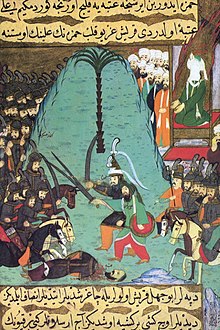Military career of Ali
Ali ibn Abi Talib took part in all the battles of the Islamic prophet Muhammad's time, except the Expedition of Tabuk, as standard bearer.
Ali's fame grew with every battle that he was in, due to his courage, valour, and chivalry, as well as the fact that he single-handedly, destroyed many of Arabia's most famous and feared warriors.
[1] Prophet Muhammad did not know that an army had left Mecca, was marching toward Medina to protect the caravan of the Quraysh, and to challenge the Muslims.
In reply to his questions, they told him that they were carrying water for an army which came from Makkah, and which was encamped on the other side of the nearby hills.
Ali and Hamza hastily dispatched Ut'bah ibn Rab'iah, carrying Ubaida to die in the Muslim lines.
Their duty was to wage "psychological warfare" against the Muslims by reading poetry and by singing amatory songs to spur the courage and the will-to-fight of the soldiers.
[citation needed] The Meccans, generously assisted by the women who had brought their timbrels, flung insults at the Muslims.
These were alternated by Hind, the wife of Abu Sufyan, who led triumphant choruses as she danced round the idol which perched on the camel.
Ali's scimitar flashed in the morning sun and the head of the standard-bearer leaped from his shoulder and rolled away on the sand.
Ibn Athir, the Arab historian, writes in his Tarikh Kamil "The man who killed the standard-bearers (of the pagans) was Ali.
[5] Ali ibn Abu Talib pressed on undismayed into the enemy ranks – it was Badr again; the Muslims were invincible.
(Sir John Glubb, The Great Arab Conquests, 1963)Ali and Hamza had broken the ranks of the Quraysh, and he was already deep inside their lines.
This however resulted in complacency, with some of the Muslim soldiers beginning to claim war spoils for themselves whilst the battle had not yet been fully won.
This was repeated several times until he killed the four children of Sufyan and added to them six more ... (Ibn Abu Al Hadeed, in his Commentary, vol 1 p 372)It was said that during 'Ali's defence of Muhammad, a call was heard, as follows: "There is no soldier but Ali, and there is no sword but Zulfiqar.
After the battle of Uhud, Abu Sufyan and the other pagan leaders realized that they had fought an indecisive action, and that their victory had not borne fruits for them.
Islam had, in fact, resiled from its reverse at Uhud, and within an astonishingly short time, had reestablished its authority in Medina and the surrounding areas.
Ali got angry, and so he walked away for a moment and then got back after he calmed down, he told Amr ibn wod al ameree "If I had killed you before then I would have satisfied myself and not God's will.
According to this tradition, Ali killed a Jewish chieftain (Marhab) with a sword-stroke, which split the helmet into two pieces, the head and the body of the victim.
Having lost his shield, Ali is said to have lifted both of the doors of the fortress from its hinges, climbed into the moat and held them up to make a bridge whereby the attackers gained access to the redoubt.
It was fought between Ali ibn Abi Talib and Muawiyah I, on the banks of the Euphrates river, in what is now Raqqa, Syria.
Then on 11th Safar 37 AH, the Iraqis under Ashtar's command, the Qurra, in Ali's army, who had their own camp started the fighting in earnest which lasted three days.
The first 3 month's both camps where in full negotiations with each other, the fighting was very limited and each day a commander of Ali's army came out with a battalion and from the other side there was the same respond.
Early in the morning Ali set his troops in formation, he gave the command of the left flank to his best general Malik al-ashtar who was renown for his bravery and fighting skills, over the right flank he gave the command to his courageous cousin named Abdullah ibn Abbas, Ali himself took position in the centre of the army.
By the time both armies stood in front of each other, Ali gave the order for a full attack, the fight was so fierce that even the bravest warriors perished.
William Muir wrote that, "Both armies drawn out in entire array, fought till the shades of evening fell, neither having got the better.
Ali posed himself in the centre with the flower of his troops from Medina, and the wings were formed, one of the warriors from Basra, the other of those from Kufa.
Amr with a great weight of horse, bore down upon the Kufa wing which gave away; and Ali was exposed to imminent peril, both from thick showers of arrows and from close encounter ... Ali's general Ashtar, at the head of 300 Hafiz-e-Qur'an(those who had memorized the Koran) led forward the other wing, which fell with fury on Muawiya's body-guards.
Four of its five ranks were cut to pieces, and Muawiya, bethinking himself of flight, had already called for his horse, when a martial couplet flashed in his mind, and he held his ground.


